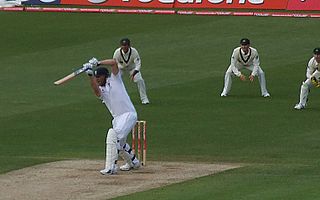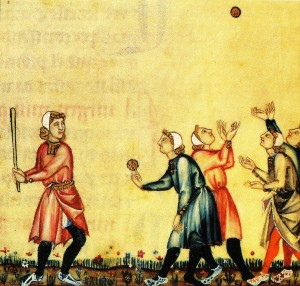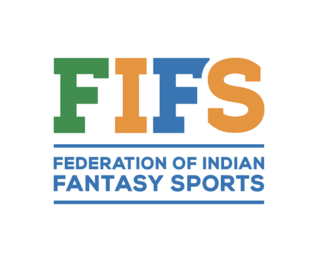A fantasy sport is a game, often played using the Internet, where participants assemble imaginary or virtual teams composed of proxies of real players of a professional sport. These teams compete based on the statistical performance of those players in actual games. This performance is converted into points that are compiled and totaled according to a roster selected by each fantasy team's manager. These point systems can be simple enough to be manually calculated by a "league commissioner" who coordinates and manages the overall league, or points can be compiled and calculated using computers tracking actual results of the professional sport. In fantasy sports, as in real sports team owners draft, trade, and cut (drop) players.

Rounders is a bat-and-ball game played between two teams. Rounders is a striking and fielding team game that involves hitting a small, hard, leather-cased ball with a wooden, plastic, or metal bat that has a rounded end. The players score by running around the four bases on the field.
In the game of cricket, the cricket pitch consists of the central strip of the cricket field between the wickets. It is 22 yd (20.12 m) long and 10 ft (3.05 m) wide. The surface is flat and is normally covered with extremely short grass, but can be completely dry or dusty soil with barely any grass or, in some circumstances, made from an artificial material. Over the course of a cricket match, the pitch is not repaired or altered other than in special circumstances - meaning that it will change condition. Any grass on the pitch in the game's first over, for example, may have disappeared by twentieth over due to wear.

This is a general glossary of the terminology used in the sport of cricket. Where words in a sentence are also defined elsewhere in this article, they appear in italics. Certain aspects of cricket terminology are explained in more detail in cricket statistics and the naming of fielding positions is explained at fielding (cricket).

An all-rounder is a cricketer who regularly performs well at both batting and bowling. Although all bowlers must bat and quite a handful of batsmen do bowl occasionally, most players are skilled in only one of the two disciplines and are considered specialists. Some wicket-keepers have the skills of a specialist batter and have been referred to as all-rounders, but the term wicket-keeper-batter is more commonly applied to them, even if they are substitute wicket keepers who also bowl.

In cricket, batting is the act or skill of hitting the ball with a bat to score runs and prevent the loss of one's wicket. Any player who is currently batting is, since September 2021, officially referred to as a batter —regardless of whether batting is their particular area of expertise. Batters have to adapt to various conditions when playing on different cricket pitches, especially in different countries; therefore, as well as having outstanding physical batting skills, top-level batters will have quick reflexes, excellent decision-making skills, and be good strategists. Although batsman is still widely used.
Baseball and cricket are the best-known members of a family of related bat-and-ball games. Both have fields that are 400 feet (120 m) or more in diameter between their furthest endpoints, offensive players who can hit a thrown/"bowled" ball out of the field and run between safe areas to score runs (points) at the risk of being gotten out, and have a major game format lasting about 3 hours.

A delivery or ball in cricket is a single action of bowling a cricket ball toward the batter. Once the ball has been delivered, batters may attempt to score runs, with the bowler and other fielders attempting to stop this by getting the batters out. When the ball becomes dead, the next delivery can begin.
In cricket, the batting order is the sequence in which batters play through their team's innings, there always being two batters taking part at any one time. All eleven players in a team are required to bat if the innings is completed.

Bat-and-ball games are field games played by two opposing teams. Action starts when the defending team throws a ball at a dedicated player of the attacking team, who tries to hit it with a bat and run between various safe areas in the field to score runs (points). The defending team can use the ball in various ways against the attacking team's players to force them off the field when they are not in safe zones, and thus prevent them from further scoring. The best known modern bat-and-ball games are cricket and baseball, with common roots in the 18th-century games played in England.
British baseball, also known colloquially in Wales as Welsh baseball, is a bat-and-ball game played in Wales, England, and to a lesser extent in Ireland and Scotland. The game emerged as a distinct sport in Merseyside, Gloucester and South Wales at the end of the 19th Century, drawing on the much older game of rounders. Teams in all locations played under the codified rules created by the National Rounders Association (later renamed as the, with the game in Wales locally organised first by the South Wales Baseball Association,, who in turn were replaced by the Welsh Baseball Union. The Irish Baseball Union were formed in 1933. Both the English Baseball Association and Welsh Baseball Union are members of the International Baseball Board.
Gambling in India varies by state; states in India are entitled to formulate their own laws for gambling activities. Some states like Goa have legalised casinos. Common gambling activities like organized betting are restricted except for selective categories including lottery and horse racing.
The Dominant Factor Test is the principle that most U.S. jurisdictions use in determining, legally, what is and is not gambling. The California Supreme Court said:

Cricket is a bat-and-ball game that is played between two teams of eleven players on a field at the centre of which is a 22-yard (20-metre) pitch with a wicket at each end, each comprising two bails balanced on three stumps. Two players from the batting team stand in front of either wicket holding bats, with one player from the fielding team bowling the ball towards the striker's wicket from the opposite end of the pitch. The striker's goal is to hit the bowled ball with the bat and then switch places with the nonstriker, with the batting team scoring one run for each exchange. Runs are also scored when the ball reaches or crosses the boundary of the field or when the ball is bowled illegally.
Daily fantasy sports (DFS) are a subset of fantasy sport games. As with traditional fantasy sports games, players compete against others by building a team of professional athletes from a particular league or competition while remaining under a salary cap, and earn points based on the actual statistical performance of the players in real-world competitions. Daily fantasy sports are an accelerated variant of traditional fantasy sports that are conducted over short-term periods, such as a week or single day of competition, as opposed to those that are played across an entire season. Daily fantasy sports are typically structured in the form of paid competitions typically referred to as a "contest"; winners receive a share of a pre-determined pot funded by their entry fees. A portion of entry fee payments go to the provider as rake revenue.
In cricket, a players' batting average is the total number of runs they have scored divided by the number of times they have been out, usually given to two decimal places. Since the number of runs a player scores and how often they get out are primarily measures of their own playing ability, and largely independent of their teammates, batting average is a good metric for an individual player's skill as a batter. The number is also simple to interpret intuitively. If all the batter's innings were completed, this is the average number of runs they score per innings. If they did not complete all their innings, this number is an estimate of the unknown average number of runs they score per innings.
Many sports are played by the people of Tamil Nadu including both traditional sports and sports from other countries.

Jeeva is a 2014 Indian Tamil-language sports film written and directed by Suseenthiran, who also produces the film along with cinematographer R. Madhi and art director Rajeevan under the banner of Vennila Kabadi Team. The film stars Vishnu and Sri Divya, while Soori and Lakshman Narayan plays supporting roles. Its music was composed by D. Imman, cinematography was handled by R. Madhi and editing was by Anthony L. Ruben, while dialogue was written by Santhosh. The film opened to positive reviews from critics on 27 September 2014 and become a successful venture at the box office.

The Federation of Indian Fantasy Sports or FIFS is India's only self-governing body for fantasy sports in India and is based in New Delhi. It supports the Indian fantasy sports industry and its interests.
Fantasy sports came to India in the later half of the 2010s. The Federation of Indian Fantasy Sports (FIFS) is the highest governing body.








